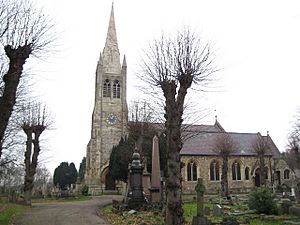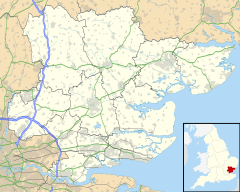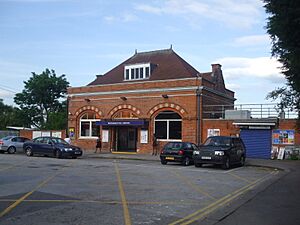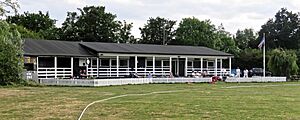Buckhurst Hill facts for kids
Quick facts for kids Buckhurst Hill |
|
|---|---|
 The parish church of St John the Baptist, built in 1838 |
|
| Population | 11,380 (2011) |
| OS grid reference | TQ415935 |
| • London | 10 mi (16 km) SW |
| Civil parish |
|
| District | |
| Shire county | |
| Region | |
| Country | England |
| Sovereign state | United Kingdom |
| Post town | BUCKHURST HILL |
| Postcode district | IG9 |
| Dialling code | 020 |
| Police | Essex |
| Fire | Essex |
| Ambulance | East of England |
| EU Parliament | East of England |
| UK Parliament |
|
| Website | Buckhurst Hill Parish Council |
Buckhurst Hill is a lively town in Essex, England. It's located near the famous Epping Forest. The town is part of the Greater London Urban Area. It sits right next to the northern edge of the London Borough of Redbridge. Buckhurst Hill grew a lot after a railway line opened in 1856. This line is now part of the Central line of the London Underground.
Contents
Discovering Buckhurst Hill
A Look Back in Time
The name "Buckhurst Hill" first appeared around 1135. Back then, it was called "La Bocherste." Later, it became "Bucket Hill." This name means a hill covered with beech trees. The area was part of Epping Forest. It had only a few houses along an old road. This road went from Woodford to Loughton.
Before railways, Buckhurst Hill was a stop for stagecoaches. These coaches traveled between London and cities like Cambridge and Norwich. Buckhurst Hill was originally part of the parish of Chigwell. There was no direct road between them. People had to cross the River Roding at Woodford to reach their church.
How the Town Grew
The Parish Church of St John was built in 1838. It was a smaller church for people to use easily. Buckhurst Hill became its own separate church area in 1867. St John's National School also opened in 1838. The land for the school was given by the local lord. The church community helped pay for the building.
The opening of Buckhurst Hill station in 1856 changed everything. The town's population grew very quickly. By 1871, almost 600 new houses were built near the station. This led to the Prince's Road school opening in 1872. Some land for these new buildings was taken from Epping Forest. But this stopped when the Epping Forest Act 1878 was passed.
Local Government Changes
Buckhurst Hill became its own local government area in 1894. This was called the Buckhurst Hill Urban District. In 1933, it joined with Chigwell and Loughton. They formed the Chigwell Urban District. Later, in 1974, Buckhurst Hill became part of the Epping Forest District. In 1996, the Buckhurst Hill Parish Council was created. This council helps manage local services for the town.
Where is Buckhurst Hill?
Buckhurst Hill is on the western edge of Essex. It is about 10.7 miles (17.2 km) northeast of central London. The town shares a border with the London Borough of Redbridge. Some parts of Epping Forest are mixed in with the houses and streets of Buckhurst Hill.
Getting Around Buckhurst Hill
Buckhurst Hill has two London Underground stations. They are Buckhurst Hill and Roding Valley. Both are on the Central line. This line connects the town directly to central London. It also links to nearby areas like Woodford and Loughton.
You can also catch London Overground trains from nearby Chingford station. These trains go to London Liverpool Street.
Most bus routes in Buckhurst Hill are London Buses services. They connect the town to places like Chingford, Loughton, and Walthamstow.
Sports and Activities
If you like sports, Buckhurst Hill has a lot to offer! The Loughton Rugby Union Football Club has its grounds here. Buckhurst Hill F.C. is a local football club.
The Buckhurst Hill Cricket Club plays in a local league. They have several teams for different age groups. They also have a special section for junior players. The club plays at two cricket fields in the town.
Learning in Buckhurst Hill
Buckhurst Hill has several primary schools. These include Buckhurst Hill Community (BHCPS), St John's (Church of England), and Whitebridge.
For secondary school, many students go to Roding Valley High School in Loughton. This school was formed when three other schools joined together.
There are also independent schools in the area. These include Braeside and Daiglen.
Famous People from Buckhurst Hill
Many interesting people have lived in or come from Buckhurst Hill:
- Sir William Addison (1905–1992) was a historian and writer. He lived in Buckhurst Hill.
- Richard Crossman was a Labour politician. He was born and grew up here.
- Mark Knopfler, a famous musician, lived in Buckhurst Hill when he first moved to London.
- Daniel Mays, an actor, grew up in the town.
- Jack Straw, another Labour politician, was born in Buckhurst Hill.
- Dick Turpin, a well-known historical figure, moved to Buckhurst Hill in 1725.
 | Lonnie Johnson |
 | Granville Woods |
 | Lewis Howard Latimer |
 | James West |




